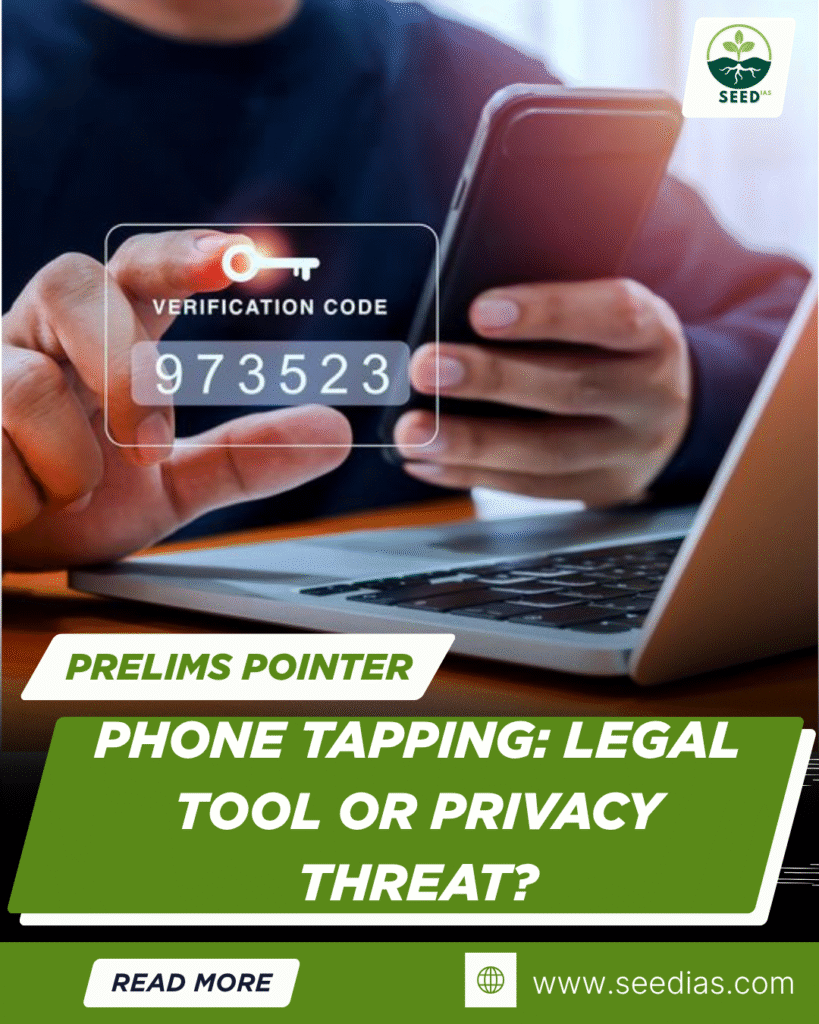Why in NEWS?
The Madras High Court and Delhi High Court delivered contrasting judgments on whether the government can legally intercept phone calls to prevent crimes, especially economic offences like bribery. The divergence has reignited the debate on lawful surveillance and citizens’ privacy.
Key Concepts and Definitions
| Term | Explanation |
|---|---|
| Phone Tapping | Monitoring or recording telephone conversations by a third party, often by the government, typically without informing the individuals involved. |
| Surveillance | Government oversight of communication for intelligence or law enforcement purposes. |
| Public Emergency/Public Safety | Legal standards under which the state is permitted to intercept communications. |
Legal Framework for Phone Tapping in India
| Law | Provisions |
|---|---|
| Indian Telegraph Act, 1885 | Section 5(2) permits interception during public emergency or public safety concerns. |
| IT Act, 2000 | Covers digital communication (emails, messaging apps, etc.). |
| Indian Post Office Act, 1898 | Regulates interception of postal communications. |
| Telegraph Rules, 1951 – Rule 419A | Lays out procedural safeguards including mandatory review by a committee. |
| Article 19(1)(a) | Protects freedom of speech. |
| Article 21 | Ensures right to life and privacy, reinforced in Puttaswamy v. Union of India (2017). |
Conflicting High Court Rulings
| Court | Case | Verdict |
|---|---|---|
| Delhi High Court | Aakash Deep Chouhan v. CBI (2020) | Phone tapping upheld. Corruption seen as a threat to economic security and public safety. |
| Madras High Court | P. Kishore v. Secretary to Government (2018) | Phone tapping quashed. No public emergency or safety threat proven. Interception deemed unlawful due to procedural lapses. |
Supreme Court’s Landmark 1997 Ruling
| Case | People’s Union for Civil Liberties vs Union of India |
|---|---|
| Key Directions | |
| Only Home Secretary (Centre/State) can authorise tapping. | |
| Review committee must vet every interception order within 2 months. | |
| No delegation below Joint Secretary level allowed. | |
| Evidence Admissibility | Illegally tapped recordings are inadmissible in court, protecting individual privacy and rights. |
In a Nutshell
Memory Code: TAP-SECURE
T – Telegraph Act enables phone tapping
A – Article 21 upholds right to privacy
P – Procedural safeguards under Rule 419A
S – Supreme Court mandates review committee
E – Evidence from illegal taps inadmissible
C – Contrasting HC rulings spark legal confusion
U – Unlawful orders breach individual freedoms
R – Reasonable restriction must be justified
E – Economic offences raise legal grey areas
Prelims Practice Questions
- Which law governs phone tapping in India?
A. IT Act, 2000
B. Indian Telegraph Act, 1885
C. Prevention of Corruption Act
D. Telegraph Rules, 1951 - According to the Supreme Court’s 1997 ruling, who can authorise phone tapping?
A. CBI Director
B. District Magistrate
C. Home Secretary
D. Telecom Secretary - Which constitutional article is most directly associated with the right to privacy in phone tapping cases?
A. Article 19(2)
B. Article 21
C. Article 14
D. Article 32
Mains Practice Questions
- GS2 (Governance):
Discuss the legal framework and constitutional safeguards around phone tapping in India. In light of recent court rulings, critically evaluate the balance between state security and individual privacy. - GS3 (Internal Security):
Phone tapping for economic offences: Is it a necessary tool or a threat to privacy? Examine the legal and ethical concerns involved.
Answer Key with Explanation
| Q No. | Answer | Explanation |
|---|---|---|
| 1 | B | Section 5(2) of the Indian Telegraph Act allows for lawful interception. |
| 2 | C | Only the Home Secretary can authorise phone tapping, not lower officials. |
| 3 | B | Article 21 ensures the right to life and privacy, central to surveillance debates. |














